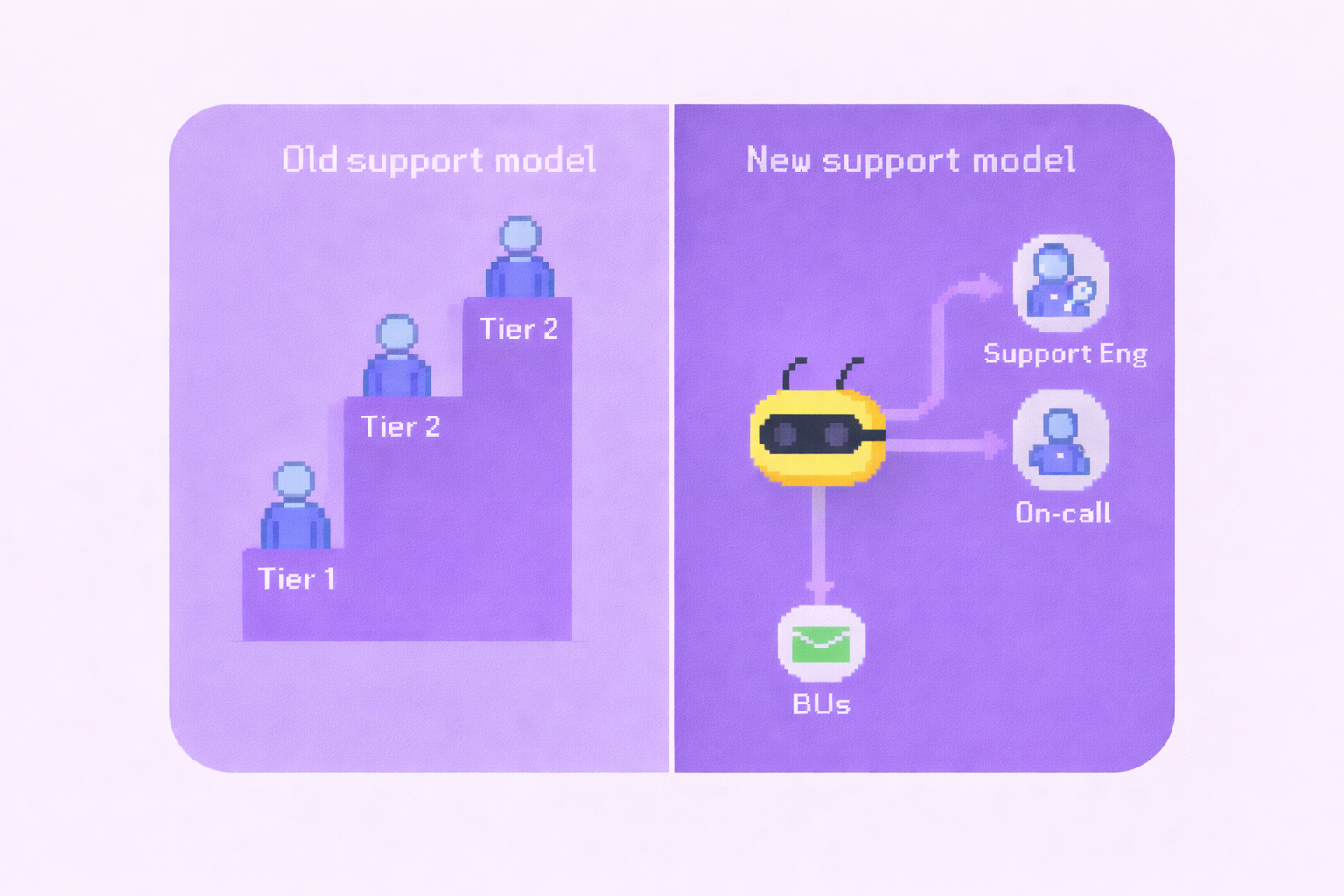21 Expert Antidotes for a Toxic Work Environment

Can you cure a toxic work environment?
Toxicity at work is a complex and nuanced issue. In many ways, it's also unique to the individuals experiencing it. There's not often a silver bullet solution, and that's one of the key reasons it's such a challenge to solve.
That's why we put together a guide that isn't limited to a particular type of toxicity or hostility in the work environment, or a single cure. Instead, this guide covers a broad spectrum of tools both leaders and employees can use to help cure toxicity in their workplace.
1. Acknowledgement
In many cases, acknowledging that a problem exists is the first and most important step towards curing a toxic work environment. Many organizations wait too long to solve the hostility in their workplace because they simply can't believe it's happening to them. And taking it a step further to talk about it with their employees once they've realized there's a problem? Absolutely not.
Modern business practices have focused increasingly on building a strong work culture, and it's hard to acknowledge that yours might not be. But you haven't failed to build an amazing organizational culture until you've stopped trying—which brings us to the next step.
Want our newest blog posts straight in your inbox? Sign up for our bi-weekly newsletter!
2. Action

If negative actions are often the source of toxicity and hostility in the work environment, positive actions are a cure. It's not enough to acknowledge that a workplace is toxic—curing it requires action.
J.T. O'Donnell, CEO of CAREEREALISM & CareerHMO wrote a great article on LinkedIn Pulse focused on helping employees find inner peace when faced with toxicity at work.
She explains that:
Sadly, most people don't want to do the work necessary. They're hoping things will magically change or get better. Or, they procrastinate and say, 'I'll focus on it next week.'
- J.T. O'Donnell
Nobody built a great company culture, or fixed an awful one, without taking action.
3. Balance

Balance is key to many things in life, and the workplace is no exception. From workload to diversity, to power dynamics and schedule, it's impossible to cultivate a great company culture without a sense of equilibrium. When the members of an organization are working under an extremely imbalanced workload or schedule, it can exacerbate any pre-existing hostilities, and have a toxic effect that extends even beyond the office, to their health, and their home life.
As an employee, it's crucial to find balance in the work that you do. Although modern organizations are placing more importance on balance, its benefits have been known since ancient times. Paracelsus, credited as the founder of toxicology, famously stated "The dose makes the poison." If work is feeling toxic, take a step back with an eye for imbalance.
As a leader, supporting and implementing policies and initiatives that support balance in your organization can positively impact a large number of employees.
4. Communication

Communication is the key to expressing oneself and understanding others. Without good communication, it would be nearly impossible to tackle issues as large and complicated as hostility in the workplace.
If you're not able to communicate effectively, any work toward dissolving hostilities, or detoxifying a company culture, will be doomed from the start.
I've heard toxic office communications described in many ways, but "an evil version of the game Telephone" is probably one of the best. Someone might say one thing to someone who isn't listening at all, or sometimes worse, is listening through a selective filter. The information or the intent behind a comment gets twisted each time it hits another filter until it's virtually unrecognizable to the person who said it.
Although it may seem basic, communication is something that many organizations fail to master. If you need some help improving communication in your company, check out this piece on effective communication.
5. Camaraderie

Building strong friendships amongst coworkers provides myriad benefits, and they're a great buffer against hostility. For one, it's much more difficult to engage in toxic behaviors against friends. It's also a source of strength and solidarity within your organization.
As Button's co-founder Stephen Milbank shared in a recent interview for the Bonusly blog,
If you’re close to [someone], and you treat them like family, you’re going to be more thoughtful towards them. There will be weeks when you cover for them, and there are going to be times when they cover for you.
-Stephen Milbank, Button
6. Consistency

Inconsistent policies may seem like a small factor in creating a toxic work environment, but they play a larger role than you may think. Without a solid bedrock, employees aren't able to root themselves strongly enough to reach their goals. In addition to that, the lack of consistency breeds a sense of constant turbulence, and unpredictability into the work environment, which can pose an unnecessary challenge and present a constant level of needless stress in daily operations.
Consistency and a sense of stability aren't only beneficial in combatting stress. As Dr. Jan West explains in her National Business Research Institute article "The High Cost of a Toxic Company Culture"
The ability to rely on management to provide stability in the workplace environment is essential, because it sharply defines behavioral expectations in employees.
-Dr. Jan West
7. Fairness
Organizations rife with idea theft, favoritism, and nepotism are nearly always top contenders for the toxic workplace award. Although the concept of fairness can be subjective at times, it's clear in most cases when an employee is facing an unfair situation.
Sometimes unfair practices sneak their way into operations, and if they happen little by little, it can be hard to notice. That's why it's important to think continually about fairness, and how it fits into decisions that impact the team.
Because fairness can be so subjective, it can help to involve a diverse group in policymaking.
8. Freedom

There are few work situations more frustrating than facing unnecessary constraints. It's particularly challenging when those constraints prevent you from doing the best work you know you're capable of, or achieving goals you know are possible. It's even worse when a leader applies additional pressure to those constraints, whether through micromanagement or unrealistic deadlines.
Under these circumstances, it's easy for resentment and hostility to form. That's why providing a team with autonomy, and the freedom to approach work in the best way they know how can make a positive difference in their work environment.
9. Fun

Work doesn't have to be all fun all the time, but a small dose of fun can have a dramatic impact on the tone and climate of organizational culture. There are different types of fun that appeal to different people, and it's important to keep that in mind. Companies like Airbnb host fun events like themed days.
Many companies plan offsite activities like happy hours, outdoor events, or retreats. Even just a little fun is an incredibly effective inoculation against toxicity. There's a nearly unlimited number of things you can do, which may seem overwhelming, but there are a lot of great resources available to help.
If you need some inspiration, check out SnackNation's list of 87 fun office activities to get the ball rolling.
10. Flexibility

It's important to understand the impact a leader's flexibility and willingness to entertain alternative views can have on the team. A "my way or the highway" approach isn't going to win any hearts or minds in the best of times, and when things get tough, it's often the source of attrition.
In her Forbes article Six Signs Your Company's Culture Is Toxic, Liz Ryan offers some useful advice:
Companies hire people because the managers can’t do everything themselves. It stands to reason that we should trust the people we hire to do their jobs, but some fearful managers can’t give up control.
They have to make all the decisions and call all the shots. A rule-driven, command-and-control culture is a toxic culture that will drive talented people away.
-Liz Ryan
11. Hiring for culture fit
Are you building a dream team or a shark tank?
It's vital to have a good sense of what your company's culture is all about and understand that not every candidate's personal culture is going to match it. Culture clash can be a source of toxicity in the workplace and a center for attrition.
This isn't to say that it's a good idea to hire for homogeneity—that can have its own detrimental consequences.
The key is to understand that each new hire has the potential to change the trajectory of your company culture. It's crucial to understand that potential before bringing people on and to gain a sense of how their personal culture will fit into the greater scheme.
TINYpulse's solution to this is to ask each interviewee to mention how they've exemplified some of their organizational values at their past jobs and give them a chance to meet with the entire team, which is a great way for all parties to gain a sense of fit early on.
12. Humility
Dr. Jan West, Organizational Psychologist, CEO, and Chairman of the Board at National Business Research Institute, Inc., reminds us why humility is such an important antidote to a hostile workplace:
The best antidote for toxic cultures is for management to humbly seek to serve the organization. When management demonstrates— walks and talks—a service attitude, the employees develop same. When employees serve internal and external customers with the service attitude, customer satisfaction soars. This is the root cause of every organization’s financial performance.
Management sets the tone, sets the pace, and determines the psychological health (or disease) of the organization. Realizing this enormous responsibility and seizing this enormous opportunity makes or breaks every organization, from its culture to its financial performance.
-Dr. Jan West
13. Morality
Everyone has their own moral compass, but if employees are regularly asked or commanded to do things that violate theirs, you can guarantee they won't stay long.
In a post he wrote to help employees identify and escape toxic work cultures, Bernard Marr shared some advice on this subject:
If something the company or an individual is doing is wrong, you don’t have to be a part of it. If actions don’t sit well with your moral code—or worse, are patently illegal—get out as soon as possible.
-Bernard Marr
Make sure you're not asking people to do things they're morally uncomfortable with.
The same action that wouldn't even show up as a blip on one person's moral radar might be a huge red flag for someone else. Being cognizant of that can make a dramatic impact on how employees feel about their job.
14. Presence
If senior management spends their time locked in an ivory tower, there's a good chance they're unwittingly sewing the seeds of toxicity in their organization. Not only is it crucial for leaders to spend time with those they're leading from a decision-making standpoint, it's also important on a personal level.
In an article for CareerAttraction, Sarah Greesonbach writes:
If the only people in your office every day are the ones who earn the smallest paychecks, that’s a sign of poor leadership, and poor leadership will lead to company culture doom.
-Sarah Greesonbach
Leaders must be present for their team, even if physical presence isn't always possible.
15. Sharing

Sharing is one of the oldest forms of social interaction, and its importance has never waned.
Whether sharing food together, sharing responsibilities or sharing space, sharing is paramount to building personal relationships in the workplace. How does your organization approach this fundamental element of human interaction?
When sharing breaks down, hostility and toxicity nearly always set in. This is why a healthy approach to sharing is so impactful in preventing toxic relationships in the office.
It's easy to support positive sharing experiences amongst teammates. It can be as simple as planning shared experiences like team lunches or providing enjoyable places for employees to congregate and share space.
16. Socialization
Socialization and a sense of belonging within a group are some of the most fundamental needs human beings exhibit. They sit just above physiological needs and personal safety on Maslow's Hierarchy of Needs:

Just like sharing, socialization is a highly effective defense against a toxic work culture. In many cases, both of these necessities can be provided for simultaneously.
17. Stress reduction

Although working in a toxic environment can be a major source of stress in itself, stress also feeds toxicity in the workplace. The interaction between stress and toxicity can create a damaging cycle if left unchecked.
One way to break that cycle is to reduce stress wherever possible.
Consider the physical environment people are working in. Long workdays spent without natural light or fresh air can contribute to stress levels.
Time away from work is a major factor in stress reduction.
Employees need a chance to step away from their duties and refresh. The value of the time spent recuperating during a vacation or long weekend nearly always outweighs any perceived loss of productivity.
Taking time out to relax and refresh each day, even if it's only for a few minutes, can make a big difference. While it might seem like regular breaks could negatively impact productivity, a lack of breaks will often harm it more.
18. Recognition
Recognition is one of the most effective ways to combat a toxic workplace, though it's sorely missing in many workplaces.
As Josh Bersin mentioned in a Forbes article detailing some of his research findings, "...our research definitely shows that in 83% of the organizations we studied suffer from a deficit in 'recognition.' And these companies are under-performing their peers."
Regular recognition works to eliminate multiple toxic elements from an organizational culture by helping to ensure that everyone's contributions are given the appreciation they deserve.
Although it may seem like a monumental task to recognize every great contribution made to your organization, both large and small, modern strategies like peer-to-peer recognition can take nearly all the heavy lifting out of the equation.
Check out our Guide to Modern Employee Recognition if you need help building a great program.
19. Self-reflection

Sometimes the most effective antidote to toxic work culture is a look in the mirror.
Expert employee engagement speaker and author David Zinger shared some great insights with us as to why it's so important to reflect.
Feeling hostile is an emotion that can be triggered with little awareness. We can stop the short circuit by being more attuned to our emotions. This is not touchy-feely stuff, as emotions drive behavior. Just remove the ‘e’ from the front of emotion and you have the key word: motion.
Enhance your emotional vocabulary and check in with yourself often to determine how you are feeling. When you are attuned to how you feel you can make choices on how you act.
Catch your emotions before they catch you...and if someone is hostile to you don't let it automatically trigger fear or retribution.
-David Zinger
20. Strategy
Dr. Marie McIntyre, author of "Secrets to Winning at Office Politics" and yourofficecoach.com, shared how important a solid strategy can be when faced with a challenging, or toxic work environment:
When I have coaching clients who feel they are in a difficult work environment, my biggest challenge is getting them to shift from complaining to strategizing. Verbally trashing their drama queen coworker or overbearing boss may feel good, but it does nothing to improve matters. So instead of focusing on others' personalities, which are completely out of their control, they need to figure out how they can influence the situation. This usually involves changing their perspective, their behavior, or both.
On the other hand, if a client is in a truly toxic organization, then we start figuring out how they can leave. Toxic organizations are the result of toxic leadership at the top, so nothing that an individual employee does will make any difference at all.
-Dr. Marie McIntyre
21. Transparency

A lack of visibility and transparency is often an opportunity for toxicity and hostility in the workplace to grow. It's much harder for toxicity to exist blatantly, and out in the open.
Louis D. Brandeis was quoted as saying, "Sunlight is said to be the best of disinfectants; electric light the most efficient policeman."
It's not even necessary to jump headfirst into radical transparency the way some companies like Buffer so famously have.
Simply taking the stance of defaulting to transparency can make a major difference. Instead of asking Do we absolutely need to share this information? ask Do we absolutely need to conceal this information?
Final thoughts
The causes of toxicity and hostility in the workplace are myriad, but the antidotes are equally plentiful.
Although this is a large list, it's really just a jumping-off point. Even if you don't find the exact solution you're looking for here, there's a good chance one of these tips can help you work towards a solution, or at the very least provide some inspiration toward finding one.
If you need more inspiration, check out our latest resource:







